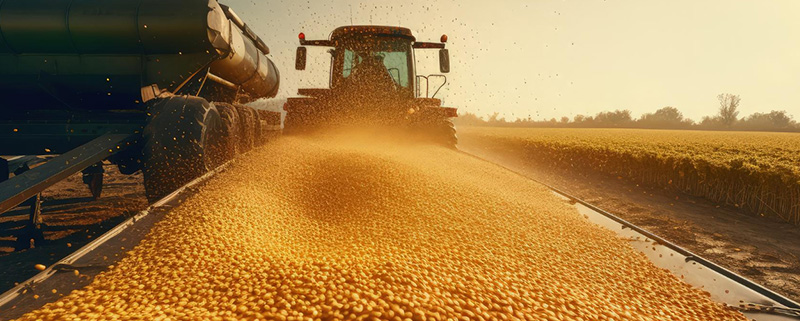
The Agribusiness Newsletter brings information and news about the main regulations and legal texts relating to the regulation of agribusiness in Brazil. This initiative seeks to cover the agribusiness industry on its transactional, litigation, tax and regulatory levels, and is an invitation for all of those working in this market to both access important news and comments on vital topics from the sector.
Enjoy reading!
Demarest’s Agribusiness Team
This material is for informative purposes only, and should not be used for decision-making. Specific legal advice can be provided by our legal team.
NEWS

Final FIAGRO regulation: market expectations and new CVM public consultations
Since its creation in 2021, the Investment Fund in Agroindustrial Productive Chains (“FIAGRO”) has become increasingly popular, and more than a hundred funds structured under this classification are listed on the website of the Brazilian Securities and Exchange Commission (“CVM”).
Law No. 14,130, of March 29, 2021, initially allowed the creation of hybrid FIAGROs, admitting different types of assets in their equity, but the CVM opted to adopt a transitional rule through CVM Resolution No. 59, of December 22, 2021, so that FIAGROs could be created under the regulation of Real Estate Investment Funds (“FIIs”), Credit Rights Investment Funds (“FIDCs”) or Equity Investment Funds (“FIPs”).
In a public consultation, the CVM suggested that hybrid FIAGROs be subject to the regulations of related funds, FIIs, FIDCs or FIPs, if more than 1/3 of their assets were credit rights, real estate or company stakes, respectively. Currently, a specific CVM regulation applicable to FIAGRO is in the public hearing stage.
The Brazilian Financial and Capital Markets Association (“ANBIMA”) submitted suggestions to the CVM during the public hearing on specific FIAGRO regulations. These rules, when published, will be included in Normative Annex VI of CVM Resolution No. 175, of December 23, 2022 (“CVM Resolution 175”), the new CVM regulatory framework applicable to investment funds.
One of the key elements of ANBIMA’s proposal is to allow FIAGROs to acquire carbon credits in both voluntary and mandatory markets, without regulatory restrictions. The vice-president of ANBIMA, Sergio Cutolo, emphasizes that CVM’s original proposal limits this acquisition to regulated markets, while ANBIMA seeks to broaden these options, given the absence of specific regulations for the carbon market in Brazil.
ANBIMA also suggested the inclusion of essential elements from other annexes to CVM Resolution 175 into the specific annex for FIAGRO. This measure aims to simplify the regulations for funds that invest more than 1/3 of their net equity in assets of other types of funds, thus eliminating the need to consult multiple annexes. Cutolo stresses that this proposal introduces autonomy and simplified procedures for the product and its service providers.
ANBIMA’s suggestions are part of the Market Development agenda of “ANBIMA in Action”, a set of strategic initiatives for 2023 and 2024. This plan was developed after extensive consultation with members, partner institutions, regulators and ANBIMA leaders. The measure proposed seeks to not only boost investment, but also to simplify the regulation in order to strengthen the sector’s efficiency and autonomy.
FIAGROs, which are highly anticipated, bring tax benefits to agribusiness investors. Recent restrictions on the capital market have sparked interest in this new instrument, which covers issues that have not been addressed by agribusiness receivables certificates.
For more information, access ANBIMA’s article in full.
MAPA holds first meeting of the PNCPD Interministerial Steering Committee
The Ministry of Agriculture and Livestock (“MAPA”) held the first meeting of the National Program for the Conversion of Degraded Pastures into Sustainable Agricultural and Forestry Production Systems (“PNCPD”).
The meeting was attended by the Minister of MAPA, Mr. Carlos Fávaro, and discussed the potential of the program, established by the Federal Government in December 2023, to attract foreign capital and advance production without deforestation.
For more information, access MAPA’s article in full.
CONAMA holds its 141st meeting
The 141st meeting of the National Environment Council (“CONAMA”) was held on March 06, 2024, attended by representatives from a number of Brazilian states, such as Ceará and Acre.
The extraordinary secretary for deforestation control and environmental planning, André Lima, outlined the challenges the federal government has faced in reducing the rates of devastation in the Cerrado ecoregion of Brazil. The current deforestation dynamics in the Cerrado, the approval of the Pantanal Law by the state of Mato Grosso do Sul, the result of the study on the impact of fires in the Pantanal ecoregion in 2020 and the creation of the New Climate Plan were discussed.
For more information, access CONAMA’s article in full.
IPAAM and MAPA discuss projects for the ABC+ Plan in Amazonas
The meeting between representatives of the Environmental Protection Institute of Amazonas (“IPAAM”) and MAPA was held to discuss projects of interest to the Sectoral Plan for Climate Adaptation and Low Carbon Emissions in Agriculture and Livestock towards Sustainable Development (2020-2030) – ABC+ Plan.
Among the proposals discussed, it is worth highlighting the possibility of cooperation between these organizations, aimed at a substantial increase in the number of Rural Environmental Registrations (“CAR”) in the state of Amazonas, especially since the CAR is seen as an essential tool for land regularization and to ensure the effective implementation of the ABC+ Sectorial Plan, coordinated by MAPA.
For more information, access the article from the state government of Amazonas.
State of Amapá discusses actions to implement and strengthen the Plan for Deforestation, Burning and Forest Fires Prevention and Control
The Plan for Deforestation, Burning and Forest Fires Prevention and Control in the State of Amapá (“PPCDAP”) is coordinated by the State Secretariat for the Environment (“SEMA”), and includes a set of programmed actions, extending until 2025, relating to deforestation control in the state of Amapá.
The actions are valid for the first half of 2024 and are preventive in nature, seeking to tackle the most critical climatic period, characterized by droughts and prolonged dry spells.
Among the priority topics discussed at the meeting were data monitoring, environmental regularization, land-use planning, sustainable production and raising awareness among civil society through educational campaigns.
For more information, access SEMA’s article in full.
Maximum Load Operation: State of Mato Grosso inspects tourist sites of environmental importance
Environmental inspectors from the Mato Grosso do Sul Environment Institute (“IMASUL”) and partner institutions visited 73 tourist sites located on the banks of the Formoso River in Bonito between February 10 and 13, 2024.
The operation aimed to check safety issues and the use and occupation of the permanent preservation areas (“APP”) of the Formoso River, especially regarding the installation of decks and walkways on the banks, as well as the existence of water abstraction wells, abstraction of surface water from the river, management and final disposal of solid waste and soil conservation, in order to prevent debris from being carried into the watercourse.
The inspectors issued 63 infraction notices with fines that, together, exceed BRL 1 million.
For more information, access IMASUL’s article in full.
State of Pará advances the Integrity and Development Program for the Livestock Production Chain
Since the Integrity and Development Program for the Livestock Production Chain was launched at COP 28 in Dubai at the end of 2023, the state government of Pará has been involved in the program in partnership with the tertiary sector and the agricultural industry. The program aims to identify 100% of the state’s cattle herd.
In practice, the initiative will apply identification earrings to the animals in order to individually track the state’s entire herd by 2026, with systematized monitoring. This program aims to ensure transparency and integrity throughout the chain, in compliance with sanitary, land and socio-environmental regulations.
For more information, access the article from the Secretariat of Environment and Sustainability of the state of Pará.
State of Rondônia discusses environmental regularization project for rural properties in the Amazon
The Project for Environmental Regularization of Rural Properties in the Amazon and in Areas of Transition to the Cerrado (CAR/KFW Project) seeks to boost the conservation and restoration of forests and other formations of native vegetation in the Amazon and the Cerrado ecoregion, especially regarding the reduction of deforestation, the maintenance of biodiversity and the reduction of gas emissions.
The project is being implemented with German government funds, through the German Development Finance Institution, which is allocating EUR 33 million in a non-reimbursable financial contribution to finance actions underway in the states of Pará, Mato Grosso and Rondônia.
For more information, access the article from the State Secretariat of Environmental Development of Rondônia.
São Paulo establishes resolution regulating the collection and use of seeds in the state’s Conservation Units
The Secretary for the Environment, Infrastructure and Logistics (“SEMIL”), Natália Resende, has signed a resolution establishing rules for obtaining, collecting and using seeds and seedlings aimed at forest conservation and restoration in the Conservation Units (“UCs”) of the state of São Paulo.
SEMIL’s resolution ensures efficiency in authorization procedures for collecting seeds and other propagules of native plant species in the UCs and other protected areas to be used in forest restoration and species conservation projects. It also offers legal certainty for public and private projects linked to this area.
For more information, access SEMIL’s article in full.
CONSEMA approves amendment to normative resolution establishing typology for issuing licenses by municipalities
The São Paulo State Environmental Council (“CONSEMA”) has approved CONSEMA Normative Resolution No. 1/2024, which establishes criteria for the issuance of environmental licenses by municipalities.
It included 40 new types of projects and activities to be licensed by municipalities, considering the scope of the impact at a local level and the size, polluting potential and nature of the activities as legal criteria. New concepts have also been included to clarify the purpose of the resolution.
For more information, access SEMIL’s article in full.
State of São Paulo establishes new criteria for environmental compensation
The Secretariat for the Environment, Infrastructure and Logistics (“SEMIL”) has published Resolution No. 02/2024, which establishes the criteria and standards regarding environmental compensation due for the suppression of vegetation.
The measure seeks to qualify this compensation based on a priority scale that establishes the areas with greatest environmental importance. The authorization suppression is issued by Companhia Ambiental do Estado de São Paulo (“CETESB”), in the case of native vegetation, for cutting down isolated trees or interventions in Permanent Preservation Areas in rural and urban areas in the state of São Paulo.
For more information, access SEMIL’s article in full.
INPE data shows reduction in deforestation alerts for the Cerrado and the Amazon
The National Institute for Space Research (“INPE”) has released data indicating a reduction in deforestation alerts in the Cerrado ecoregion. Between January 2023 and January 2024, there was a 33% reduction in deforestation alerts. In the Amazon rainforest, the decrease amounted to 29% over the same period.
The data released by INPE was obtained by analyzing the “Deter” monitoring system, a tool that uses satellite images to detect and alert about deforestation activities.
For more information, access the article from the state Government of Tocantins.
AGRO IN THE MEDIA

All eyes on Gilson Bittencourt: the day after the shock on CRAs and LCAs
The market’s reactions to the CMN’s decision, which, in an attempt to increase revenue, closed loopholes in the raising of CRAs and hindered the issuance of LCAs.
Acquisition and lease of rural property by a foreign citizen
What to expect from the STF trial?
Rural producers file for court-supervised reorganization
Crop losses and increased costs led to a 300% increase in court-supervised reorganization requests.
Musical chairs: how the market will respond to the restriction on exempt bonds
Stricter regulations will increase the cost of financing, but should free up resources for investment funds – and increase competition for incentivized debentures
REGULATION

TAX REGULATION
Tax Reform Regulation – Next Steps
The tax reform approved by the National Congress resulted in the enactment of Constitutional Amendment 132/2023.
However, despite the approval of the text by the Congress’ two legislative houses, a number of aspects still need to be regulated through a supplementary law.
One example is the introduction of a selective tax (excise tax), which will seek to mitigate the impacts of mining activities and other activities that are harmful to health and the environment. However, the activities, products and services that will be covered by this tax are yet to be defined.
The Congress will need to define the degree to which the harmfulness of products and activities will be assessed, that is, whether only the intrinsic nature of the good will be considered, or that of its application in the production chain, for example, strategic minerals for a sustainable energy transition, fertilizers and pesticides.
In addition, the amendment also allows states to create state contributions on primary and semi-processed products, which could also burden the agribusiness production chain.
These funds will replace the current state funds and are pending regulation through a supplementary law, as are a number of other topics. These include the definition of rural producer credit, the creation of sustainability funds in Amazonas and the implementation of differentiated tax regimes for food for human consumption, agricultural products and inputs, as well as horticultural products, fruit and eggs.
In addition, the proposed state and municipal Taxes on Goods and Services (“IBS”) and the federal Contribution on Goods and Services (“CBS”) rate reductions, which are yet to be defined by a supplementary law, contradict the benefits granted by the Brazilian Value-Added Sales Tax (“ICMS”) Agreement 100/97, for example, as there is still no definition of potential credit reversals associated with this rate reduction.
STF position enables discussion on maintaining ICMS credits on transfers
ICMS Agreement No. 178/2023, published in December 2023, established the mandatory partial transfer of ICMS credits in transactions carried out between establishments of the same ownership in interstate transfers.
Supplementary Law No. 204/2023, also published in December 2023, then prohibited ICMS from being levied on these transfers, merely guaranteeing the credit to both the establishment of destination and the establishment of origin, without any mention of whether the transfer was mandatory.
Given the position of the Federal Supreme Court (“STF”) on the matter, in Action for Declaration of Constitutionality (“ADC”) No. 49, judicial measures may be used to prevent the mandatory transfer of ICMS credits between establishments of the same owner and the requirement to reverse the corresponding credits.
Maintaining the full credit amount in the establishment of origin is also up for discussion, considering the absence of a STF ruling in this regard.
PGE-SP establishes guidelines for tax settlements in the state of São Paulo
On February 07, 2024, the São Paulo State Attorney General’s Office (“PGE-SP”) published Notice 01/2024, which established the guidelines for tax settlements, specifically relating to interest on late payment of ICMS debts registered as overdue tax liabilities.
The notice allows ICMS debts that have been charged interest above the Selic rate to be paid in installments, offering a 100% discount on interest for late payment and a 50% discount on the remaining debt (fines, interest and legal charges), excluding the principal amount.
Payments can be carried out in a single installment or in up to 120 installments, updated according to the Selic rate. In addition, the notice stipulates that accession to the tax settlement will encompass all active debt certificates from the same tax execution, if the debt is under judicial collection.
Taxpayers have the option of using accumulated ICMS credits (resulting from export operations, for example), rural producer credits and court-ordered debt payments to offset the debt, limited to 75% of the value of the final consolidated credit after discounts.
It is worth highlighting that the application period began on February 07, 2024, and ends on April 29, 2024. Finally, accession, whose deadline is April 30, 2024, implies irrevocable and irreversible confession of the debts settled, and full collateral for the debt is required for installments of more than 60 installments.
FINANCIAL REGULATION
New CMN rules impact securities for the agribusiness sector
Recent regulations published by the National Monetary Council (“CMN”) introduce new rules governing the issuance of agribusiness receivables certificates (“CRA”) and agribusiness letters of credit (“LCA”), some of the main financial and capital market instruments linked to agribusiness financing.
CMN Resolution No. 5,119 of February 01, 2024, which establishes changes to the LCA rules and to the Rural Credit Manual (“MCR”), among other aspects, adjusted the eligible backing and maturity dates of the LCA (and the LCI, regarding the real estate sector), important funding modalities for financial institutions and fixed-income investments, especially for investors in general.
In turn, CMN Resolution No. 5,118, of February 01, 2024, as amended by CMN Resolution No. 5,121, of March 01, 2024, which provides for the backing of CRA (and CRI, regarding the real estate sector), established new rules applicable to the structuring of such backing, which ended up creating restrictions on certain structures previously allowed in the securitization of agribusiness credit rights.
Our financial and capital markets experts have compiled analyses of these regulations, which are available at the following links:
- CMN Resolution No. 5,118 (original)
- CMN Resolution No. 5,119
- CMN Resolution No. 5,118, as amended by CMN Resolution No. 5,121
For more information, access CMN Resolution No. 5,118 / CMN Resolution No. 5,119 / CMN Resolution No. 5,121.
ENVIRONMENTAL REGULATION
Environmental Licensing
— Federal
ICMBIO approves Normative Legal Guidance on environmental conditions and environmental compensation
The Chico Mendes Institute for Biodiversity Conservation (“ICMBIO”) published ICMBIO Ordinance No. 285/2024, which approves the Normative Legal Guidance (“OJN”) concerning the conditions established in environmental licenses and their distinction from the environmental compensation provided for projects with a significant environmental impact.
According to the approved OJN, if any preventive condition provided for in the environmental license can completely avoid the impact, mitigating or compensating conditions should not be required.
— Goiás
State of Goiás regulates procedures for issuing Environmental Property Declarations
Through Normative Instruction No. 02/2024 issued by the State Secretariat for the Environment and Sustainable Development (“SEMAD”), the State of Goiás has regulated the procedures for issuing the Property Environmental Declaration (“DAI”).
The DAI is a voluntary declaratory act carried out by the owner of urban or rural properties with environmental liabilities, which aims to regularize such properties through the signing of a Settlement Agreement between the owner and SEMAD.
— Paraíba
State of Paraíba announces activities exempt from renewing environmental operating licenses
The Environmental Protection Council of the State of Paraíba (“COPAM”), through Resolution No. 5.534/2024, has published a new list of activities exempt from renewal of environmental operating licenses (“RLO”).
Among the exempt activities are:
-
- dams, weirs and reservoirs used for public supply;
- rural land reform settlements; and
- transmission lines up to 69kv.
However, these activities may be exempt from renewal of the environmental operating license if they also meet the cumulative criteria established in the resolution.
Access the resolution in full: Official Gazette of the State of Paraíba – February 09, 2024
State of Paraíba establishes guidelines on environmental compensation for projects with significant environmental impact
The Paraíba State Legislative Assembly has enacted Law No. 13,078/2024, which aims to establish guidelines for environmental compensation, to be followed by projects with a significant environmental impact.
According to the law, among other provisions, the percentage of funds earmarked for environmental compensation cannot be less than 1% of the investments needed to implement the project.
Access the law full: Official Gazette of the State of Paraiba – February 23, 2024
— Maranhão
State of Maranhão publishes list of low-risk economic activities that can be carried out without environmental licensing
The Legislative Assembly of the State of Maranhão has enacted Ordinary Law No. 12,209/2024, which classifies various economic activities as low risk, such as horticulture.
The activities provided for in the law can be carried out without any public licensing act, as long as they are not carried out in areas such as:
-
- special environmental preservation areas;
- environmental protection areas;
- legal reserve areas; and
- permanent preservation areas.
For more information, access the Official Gazette of the State of Maranhão (page 78.)
Forestry
— Santa Catarina
State of Santa Catarina establishes the State Policy for Encouraging Precision Agriculture
The State Government of Santa Catarina published Law No. 18,855/2024, which establishes the State Policy for Encouraging Precision Agriculture in the state of Santa Catarina, intended to foster the modernization and sustainability of agriculture through the adoption of precision technologies in agricultural production.
In short, the state policy aims to:
-
- encourage the adoption of precision technologies in agricultural production;
- support research and development of precision technologies for agriculture;
- establish partnerships with public and private institutions for the development of precision agriculture in the state; and
- establish criteria and guidelines for granting tax and financial incentives to rural producers who adopt precision technologies in agricultural activities.
— Piauí
State of Piauí requires holders of vegetation suppression authorizations to submit proof of compliance with mandatory forest replenishment
The State Secretariat for the Environment and Water Resources of Piauí (“SEMARH”), through Normative Instruction No. 20/2024 (page 162), established the administrative procedures for Mandatory Forest Replenishment (“RFO”) and ordered all holders of vegetation suppression authorizations (“ASV”) issued in the last five years to submit proof of compliance with the RFO within 15 days of receiving the notification.
The RFO has been provided for in the state since 2019 and applies to individuals or legal entities that use forest raw materials from the suppression of native vegetation or that hold an authorization for ASV.
The RFO can be carried out as follows:
-
- directly: through planting seedlings, preferably native, assuming responsibility for implementing, maintaining and consolidating the plantation; or
- indirectly: through acquiring credits generated by third parties or through payment to the State Fund for Conservation Units (“FEUC”).
Agricultural pesticides
IBAMA restricts use of pesticides capable of affecting bees
On February 23, 2024, the Brazilian Institute for the Environment and Renewable Natural Resources (” IBAMA “) banned ground spraying not directed at soil or plants and aerial spraying of thiamethoxam-based pesticides.
In addition, the use of thiamethoxam as an active ingredient will no longer be authorized in ten types of crops, such as potatoes, eggplants, onions and eucalyptus.
Holders of product registrations containing the substance will have 180 days to adjust their labels and leaflets.
Access the article from the Ministry of the Environment.
MAPA – MINISTRY OF AGRICULTURE AND LIVESTOCK REGULATION
Special Agricultural Defense Appeals Commission set up to decide on Self-Control Law cases
On February 20, 2024, the MAPA announced the implementation of the Special Agricultural Defense Appeals Commission (“CERDA”) to decide on administrative proceedings for infractions applied under Law No. 14.515/2022 (the “Self-Control Law”).
The penalties include a fine of up to BRL 150,000, a warning, confiscation of the product and suspension or revocation of the establishment’s registration or professional license.
Ordinance amends import requirements for seeds from the US and other countries
On February 09, 2024, Ordinance No. 1,005/2024 was published, amending Normative Instruction No. 16/2015, which provides for phytosanitary requirements for the import of seeds from different species and countries. This ordinance updates the import requirements for specific seeds/crops originating in Chile, Denmark, US, France, Holland, Italy, Israel and Japan.
New technical regulation of bacon has been extended
The MAPA has extended the deadline for companies in the sector to adapt to the new rules of the Technical Regulation on the Identity and Quality of Bacon, published in February 2023. Now, companies will have until October 08, 2024, to adapt their operations, according to an additional deadline granted by Ordinance No. 1.008/2024.
REAL ESTATE REGULATION
Bill aims to change the minimum fraction for parceling out rural property
Bill No. 6088/23 (“PL”) is currently being processed by the Brazilian Congress. It aims to amend Article 8 of Federal Law No. 5,868/1972, establishing as the minimum fraction for the parceling of rural property the area of five thousand square meters, equivalent to 0.5 hectare.
The Minimum Parceling Fraction (“FMP”) of a rural property consists of the minimum area that the property must have in order to be able to proceed with its dismemberment or division. Therefore, it is not possible to dismember or divide a rural property that results in an area smaller than the area corresponding to the module calculated for the property. Currently, this area varies between two and five hectares, according to the legislation of the municipality in which the property is located.
The PL aims to reduce and standardize the FMP throughout Brazil, which we believe is beneficial, since information about the FMP can be difficult to access, depending on the municipality in which the property is located. In addition, as it is a municipal variable, the FMP poses a certain level of uncertainty regarding the possibility of any dismemberment or division of rural properties.
Therefore, the standardization and reduction of the FMP will provide greater legal certainty regarding decisions on the possible dismemberment or division of rural property and will expand the list of properties that can be dismembered or divided, since the minimum area required will be smaller. According to the representative who created the bill, the reduction in the FMP is an old demand that can now be implemented, since technological advances have enabled increased productivity and guaranteed family livelihoods in smaller rural areas.
The bill is currently being analyzed by the committees on Agriculture, Livestock, Supply and Rural Development; and the Constitution and Justice and Citizenship, and the matter is still subject to discussion until the legislative amendment is approved.
Related Partners
Related Lawyers
Amanda Gabrielle Ferreira Cavalcante
Isabella Sinetti
Lucas Schiavon Maturano
Monique Guzzo
Robson de Oliveira
























